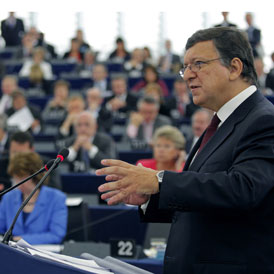EU facing biggest challenge in its history – Barroso
As inspectors arrive in Greece to discuss bailing out the country’s economy, the president of the European Commission says the EU is facing the biggest challenge in its history.
The officials from the Commission, European Central Bank and International Monetary Fund (IMF) will make a decision on whether Greece has done enough to merit a further 8bn euros (£7bn) of bailout money.
On Tuesday, the Greek parliament approved the latest measure to bolster the country’s public finances – a property tax that has sparked outrage among the middle classes.
With the future of the single currency under threat, Commission President Jose Manuel Barroso told MEPs in Strasbourg the EU was in the midst of the greatest challenge in its 50-year history. He proposed a new financial transactions tax that will be resisted by Britain, because of its impact on the City of London, unless it is introduced at a global level.

Bailout fund
Referring to the debt crisis that has hit Greece and is also threatening Spain and Italy, Mr Barroso said the £440bn euro bailout fund – the European Financial Stability Fund (EFSF) – needed to be beefed up.
The German parliament will vote on Thursday on strengthening the fund, with Berlin uneasy about proposals that would see its size increase from 440bn euros (£384bn) to about 2tr euros (£1.7tr).
We are facing the greatest challenge in the history of our union. European Commission President Jose Manuel Barroso
Mr Barroso said: “We are facing the greatest challenge in the history of our union. The financial, economic and social crisis has resulted in a crisis of confidence and trust not seen in decades. A lack of confidence and trust in governments, in leaders and in Europe, in our ability to change things for the better.”
He brushed aside concerns that Greece could be forced out of the euro, but said Athens would have to pay a price. “Greece is, and Greece will remain, a member of the euro area. Greece must implement its commitments in full and on time. In turn, the other euro area members have pledged to support Greece and each other.”
‘We risk fragmentation’
Mr Barroso warned that if the EU’s 27 member states failed to integrate further, “we risk fragmentation”. Monetary union had been achieved, but it was time to go further. “We need to complete our monetary union with an economic union. It was an illusion to think that we could have a common currency and a single market with national approaches to economic and budgetary policy.”
A £110bn (£96bn) bailout package for Greece was agreed in the summer of 2010. Before sanctioning the latest tranche of 8bn euros (£7bn), the inspectors will consider if Greece is succeeding in bringing its public finances under control.
They suspended an earlier visit because of doubts about the Greek government’s progress, but parliament’s approval of the new property tax will reassure them. The tax is unpopular in Greece, where voters have been told they will have their electricity cut off if they do not pay it.
‘Rescue package’
Following weekend talks in Washington attended by officials from the IMF and World Bank and G20 finance ministers, proposals have emerged that are designed to bring the current debt crisis to an end.
They reportedly include: a 50 per cent debt writedown for Greece, increasing the amount of money in the EFSF and the recapitalisation of Europe’s banks.
Topics
Business,World, Banking, Coalition, Conservative Party, David Cameron, Economic crisis: special report, European cuts, European Union, G20, George Osborne, Ireland bailout, Ireland deficit, Liberal Democrats, Nick Clegg, Pensions, Public Sector, Silvio Berlusconi, Spending cuts, Spending review (CSR), UK economy, Vince Cable-
Latest news
-
Taylor Swift’s new break-up album breaks records3m

-
NHS trust fined £200K for failings that led to death of two mental health patients3m

-
Sunak vows to end UK ‘sick note culture’ with benefit reform3m

-
‘Loose talk about using nuclear weapons is irresponsible and unacceptable’, says head of UN’s nuclear watchdog3m

-
‘There wasn’t an Israeli attack on Iran,’ says former adviser to Iran’s nuclear negotiations team7m

-




